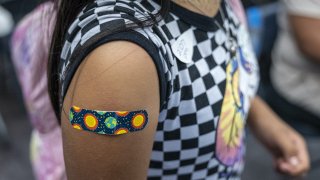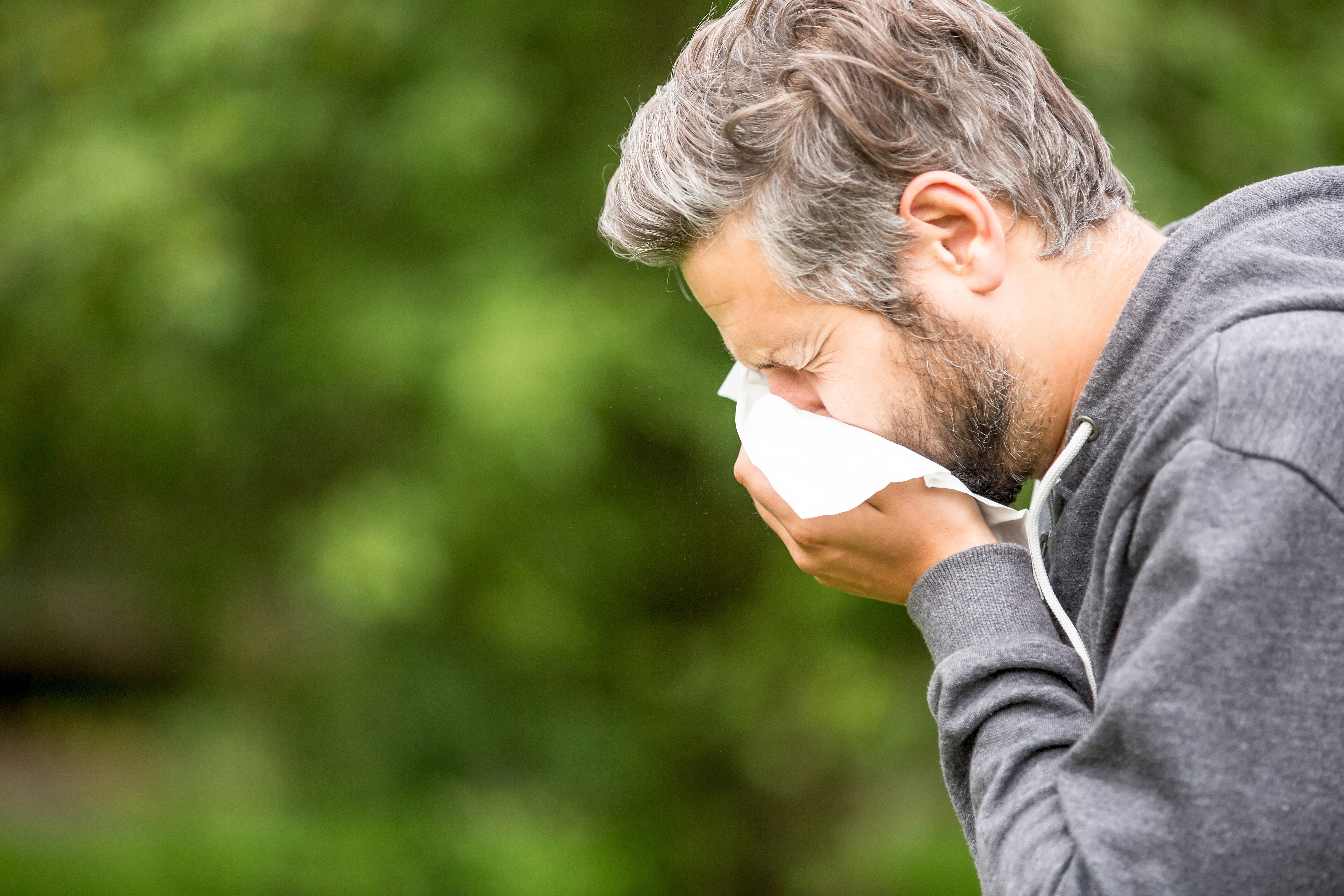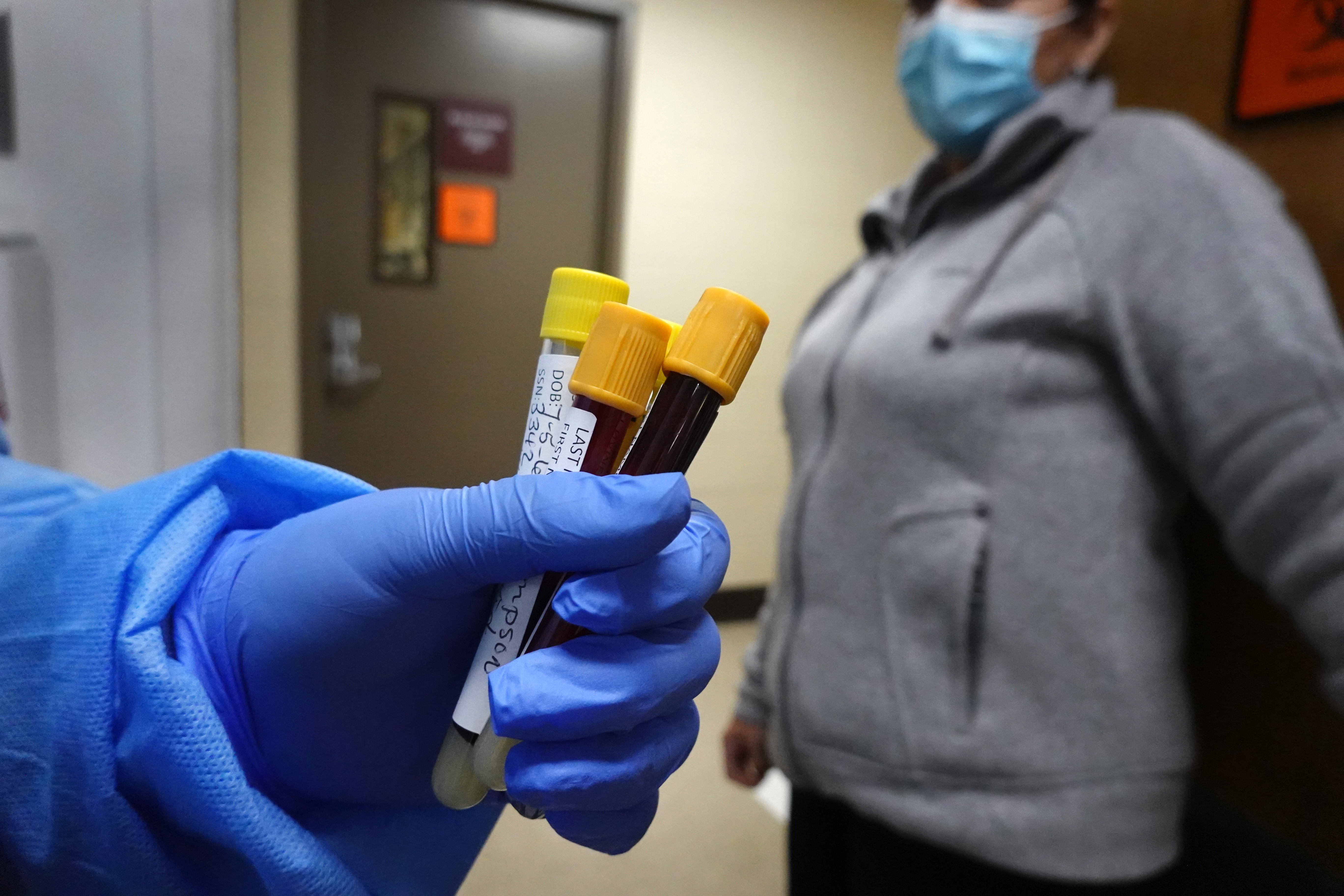
As Moderna took the next step forward toward getting the first COVID vaccination authorized for children under the age of 5, when could parents expect shots to begin?
Frustrated families are waiting impatiently for a chance to protect the nation’s littlest kids as all around them people shed masks and other public health precautions -- even though highly contagious coronavirus mutants continue to spread.
The nation’s 18 million children under 5 are the only age group not yet eligible for vaccination.
While the race is on to get the youngest members of the population vaccinated, which vaccine will work best and when might one be approved?
Here's what we know so far.
Which vaccines are seeking approval for children under 5 and where do they stand?
Moderna on Thursday asked U.S. regulators to authorize low doses of its COVID-19 vaccine for children younger than 6, a long-awaited move toward potentially opening shots for millions of tots.
Moderna submitted data to the Food and Drug Administration that it hopes will prove two low-dose shots can protect babies, toddlers and preschoolers -- albeit not as effectively during the omicron surge as earlier in the pandemic.
“There is an important unmet medical need here with these youngest kids,” Dr. Paul Burton, Moderna's chief medical officer, told The Associated Press. Two kid-size shots “will safely protect them. I think it is likely that over time they will need additional doses. But we're working on that.”
Currently, Pfizer's COVID vaccine has been the only one approved for emergency use in the US for children between the ages of 5 and 17.
Feeling out of the loop? We'll catch you up on the Chicago news you need to know. Sign up for the weekly Chicago Catch-Up newsletter.
Moderna's vaccine isn't the only one in the race. Pfizer is soon expected to announce if three of its even smaller-dose shots work for the littlest kids, months after the disappointing discovery that two doses weren’t quite strong enough.
Competitor Pfizer currently offers kid-size doses for school-age children and full-strength shots for those 12 and older. The company is testing even smaller doses for children under 5 but had to add a third shot to its study when two didn’t prove strong enough.
What still needs to happen before shots can begin and when are they expected?
While questions are swirling about what's taking so long, Marks pointedly told lawmakers this week that the FDA can't evaluate a product until a manufacturer completes its application.
The FDA will publicly debate the evidence with its scientific advisers before making a decision, and Marks said multiple meetings would be set to cover several expected applications.
If FDA clears vaccinations for the littlest, next the Centers for Disease Control and Prevention would have to recommend who needs them -- all tots or just those at higher risk from COVID-19.
Chicago Department of Public Health Commissioner Dr. Allison Arwady said she expects the FDA could make its determination "possibly in May," which could clear the way for shots to begin this summer.
"My guess right now is it will be June when we will have potentially vaccine available for those youngest children," she said during a Facebook Live Thursday. "But it all depends on the FDA and the CDC and its external experts advising."
How effective are the vaccines in children?
Whether it’s one company’s shots or both, FDA vaccine chief Dr. Peter Marks said the agency will “move quickly without sacrificing our standards” in deciding if tot-sized doses are safe and effective.
“It’s critically important that we have the proper evaluation so that parents will have trust in any vaccines that we authorize,” Marks told a Senate committee.
Earlier this year, the FDA, worried about the omicron variant's toll on kids, had taken the extraordinary step of urging Pfizer to apply for OK of the extra-low dose vaccine before it's clear if tots will need two shots or three. The agency's plan could have allowed vaccinations to begin within weeks.
But in February, the FDA reversed course and said it had become clear the agency needed to wait for data on how well a third shot works for the youngest age group. Pfizer said in a statement at the time that it expected the data by early April.
Marks said he hoped parents would understand that the agency's decision was part of its careful scientific review of the evidence Pfizer has submitted so far.
That information "made us realize that we needed to see data from a third dose from the ongoing trial in order to make a determination," Marks told reporters. “We take our responsibility for reviewing these vaccines very seriously because we’re parents as well."
In a study of kids ages 6 months through 5 years, two Moderna shots — each a quarter of the regular dose — triggered high levels of virus-fighting antibodies, the same amount proven to protect young adults, Burton said. There were no serious side effects, and the shots triggered fewer fevers than other routine vaccinations.
But the vaccine proved between about 40% and 50% effective at preventing symptomatic COVID-19 during the trial. Burton blamed the omicron variant's ability to partially evade vaccine immunity, noting that unboosted adults showed similarly less effectiveness against milder omicron infections. While no children became severely ill during the study, he said high antibody levels are a proxy for protection against more serious illness — and the company will test a child booster dose.
Data posted online last month showed two doses of the Pfizer-BioNTech COVID-19 vaccine offer almost no protection against coronavirus infection in kids ages 5 to 11, but did offer protection against serious illness.
Researchers from the New York State Department of Health found that the vaccine’s effectiveness dropped to 12% from 68% in the age group in December and January when the omicron variant of the coronavirus began circulating widely in the United States.
The Pfizer shots still offered protection against serious illness from COVID, the researchers found, with protection against hospitalization declining to 48 percent from 100 percent over the same time period.
COVID-19 vaccines aren't as effective against the super-contagious omicron mutant — in people of any age — and Moderna's study found the same trend.
Why do health officials want to get children vaccinated?
While COVID-19 generally isn’t as dangerous in youngsters as adults, some do become severely ill or even die. About 475 children younger than 5 have died from COVID-19 since the pandemic’s start, according to the CDC, and child hospitalizations soared at omicron's peak.
Yet it’s not clear how many parents intend to vaccinate the youngest kids. Less than a third of children ages 5 to 11 have had two vaccinations, and 58% of those ages 12 to 17.
Would children be given the same size dose as adults?
The younger the child, the smaller the dose being tested.
Moderna enrolled about 6,900 kids under 6 — including babies as young as 6 months — in a study of the 25-microgram doses.
Competitor Pfizer currently offers kid-size doses for school-age children and full-strength shots for those 12 and older. The company is testing even smaller doses for children under 5.
What about side effects?
Parents may find it confusing that Moderna is seeking to vaccinate the youngest children before it's cleared to vaccinate teens. While other countries already have allowed Moderna’s shots to be used in children as young as 6, the U.S. has limited its vaccine to adults.
The FDA hasn't ruled on Moderna's earlier request to expand its shots to 12- to 17-year-olds because of concern about a very rare side effect, heart inflammation.
Heart inflammation sometimes occurs in teens and young adults, mostly males, after receiving either the Pfizer or Moderna vaccines. Moderna is getting extra scrutiny because its shots are a far higher dose than Pfizer’s.
But the CDC recently found the risk of myocarditis and other inflammatory syndromes was higher following infection from COVID than after Pfizer or Moderna vaccination in males and females ages 5 and older.
The company said that, armed with additional evidence, it is updating its FDA application for teen shots and requesting a green light for 6- to 11-year-olds, too. Dr. Stephen Hoge, Moderna’s president, said he’s optimistic the company will be able to offer its vaccine “across all age groups in the United States by the summer.”
Moderna says its original adult dose — two 100-microgram shots — is safe and effective in 12- to 17-year-olds. For elementary school-age kids, it’s using half the adult dose.
About 1.5 million adolescents have used the Moderna vaccine in other countries, “and so far we've seen very reassuring safety from that experience," Hoge said.
The heart risk also seems linked to puberty, and regulators in Canada, Europe and elsewhere recently expanded Moderna vaccinations to kids as young as 6.
“That concern has not been seen in the younger children,” said Northwestern’s Muller.
While the study wasn't large enough to detect very rare side effects, Moderna said the small doses were safe and that mild fevers, like those associated with other common pediatric vaccines, were the main reaction.



